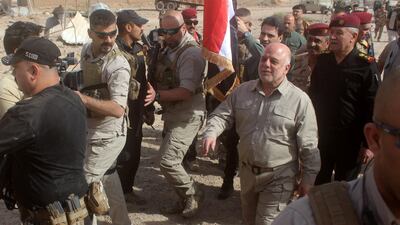Iraq’s prime minister Haider Al Abadi called on the Iraqi Kurdistan government to comply with Baghdad’s request to regain control of the country’s northern borders.
Baghdad’s central government imposed strict measures against the Kurdistan Regional Government (KRG) after Iraqi Kurds overwhelmingly voted for independence last September — a move that Baghdad as well as neighbouring Iran and Turkey deemed illegal and unconstitutional.
At his weekly press conference, Mr Al Abadi said that Baghdad is committed to controlling the KRG's borders "without violence".
“We will regain control over the border areas without violence and escalation, Baghdad will not wait forever,” he said.
Baghdad unleashed an economic barrage against the KRG by halting all international flights in and out of the semi-autonomous region and launched a military operation that recaptured the oil-rich city of Kirkuk and other disputed areas. These areas lie outside of the Kurdish region but are claimed by both Baghdad and Erbil, the capital city of Kurdistan region.
“We do not seek confrontation with the Kurdish regional government, we have applied federal authority in disputed areas peacefully and border crossings must come under federal jurisdiction,” said Mr Al Abadi.
The Iraqi armed forces have threatened to resume military operations against the Kurds, accusing them of delaying the handover of control of borders and taking advantage of negotiations to bolster their defences.
“I call on the KRG to co-operate with these measures to improve transparency and accountability,” said Mr Al Abadi late on Tuesday.
___________________
Read more
Iraq Kurds say they respect federal court decision banning independence
Iraqi premier pushes plan to cut Kurdistan's budget share
UN urges dialogue between Baghdad and Erbil on basis of constitution
___________________
His remarks came after the Kurdistan government said it would respect a ruling by Iraq's federal court that prohibits its push for independence.
The KRG said: “We believe that this decision must become a basis for starting an inclusive national dialogue between Erbil and Baghdad to resolve all disputes.”
Mr Al Abadi had previously urged the northern semi-autonomous Kurdish region to abide by the court's decision. He welcomed Erbil’s announcement and stressed that “Iraq’s constitution aims to preserve the unity and integrity of country”.
“The constitution ensures security, stability and the implementation of the federal government’s authority on all of its territory which is in the interests of all the people in Iraq, especially the Kurds,” he said.
The Kurdish announcement marks Erbil’s latest attempt to salvage negotiations with Baghdad's central government.
Iraq's vice president Ayad Allawi renewed his call for dialogue between Baghdad and Erbil within the framework of the Iraqi constitution.
"Kurdistan's respect for Iraqi unity would pave the way for a more open and transparent dialogue based on common interests and contribute to finding a solution to all differences," Mr Allawi said.
Meanwhile, Mr Al Abadi said he was determined to pay the "rightful salaries" of government employees in the Kurdistan region.
"We are determined to pay the rightful salaries of state employees in the Kurdistan region. We have no intention of cutting salaries as some have falsely claimed and we will strip away corruption and inefficiency by local authorities,” Mr Al Abadi said.
Regarding the rising tensions in the region, the prime minister said that the cabinet discussed how Iraq will play a positive role in reducing the escalation.
"The escalation in the region is dangerous and benefits no one and harms the interests and the people of the region, Iraq will not be taking sides," he confirmed.
"Our vision is for shared security through cooperative economic development.”


